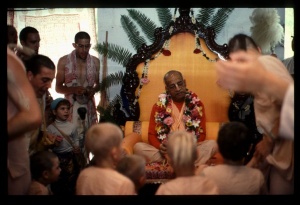SB 11.22.49

A.C. Bhaktivedanta Swami Prabhupada
Please note: The synonyms, translation and purport of this verse were composed by disciples of Śrīla Prabhupāda
TEXT 49
- ātmanaḥ pitṛ-putrābhyām
- anumeyau bhavāpyayau
- na bhavāpyaya-vastūnām
- abhijño dvaya-lakṣaṇaḥ
SYNONYMS
ātmanaḥ — one's own; pitṛ — from the father or ancestors; putrābhyām — and the son; anumeyau — can be surmised; bhava — birth; apyayau — and death; na — is no longer; bhava-apyaya-vastūnām — of all that is subject to generation and destruction; abhijñaḥ — one who is in proper knowledge; dvaya — by these dualities; lakṣaṇaḥ — characterized.
Translation and purport composed by disciples of Śrīla Prabhupāda
TRANSLATION
By the death of one's father or grandfather one can surmise one's own death, and by the birth of one's son one can understand the condition of one's own birth. A person who thus realistically understands the creation and destruction of material bodies is no longer subject to these dualities.
PURPORT
The Lord has described the nine stages of the material body, beginning with impregnation, gestation and birth. One may argue that a living entity cannot remember his presence in the mother's womb nor his birth and early infancy. The Lord therefore states here that one can experience these phases of bodily existence by studying one's own child. Similarly, although one may hope to live forever, by experiencing the death of one's father, grandfather or great-grandfather, one has definite proof that the material body will die. A sober person, knowing the soul to be eternal, therefore gives up false identification with the temporary, unreliable body and takes shelter of the devotional service of the Lord. By this process one can escape the artificial imposition of birth and death.